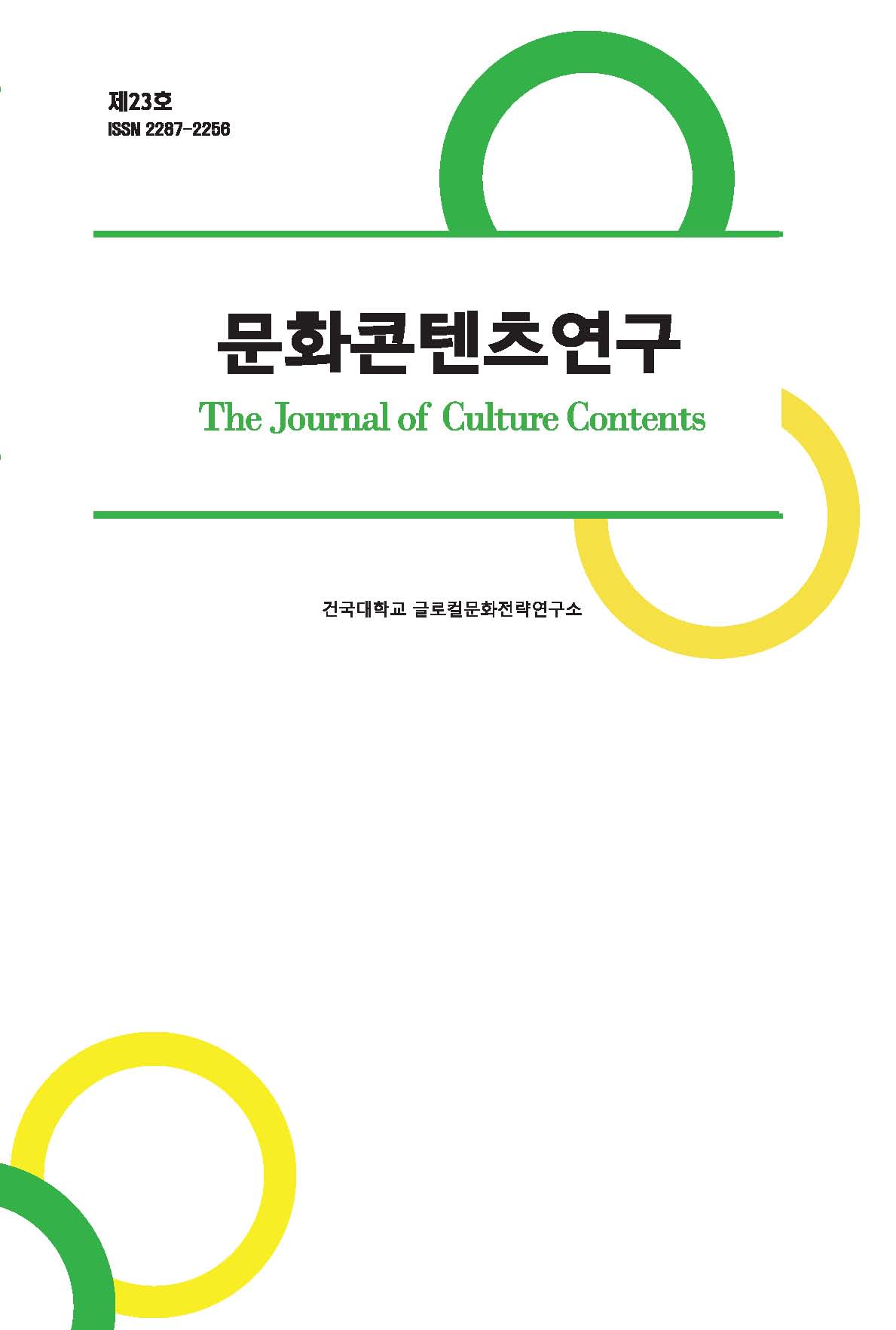Abstract
References
Information
The use of ‘universe’ or ‘world’ as brand names for media franchises can easily be found in recent times, as worldbuilding is recognized as a fundamental strategy in content branding. Based on this background, this study examines the concept of worldbuilding and aims to establish its methodology. The current study presents the zombie content, specifically the drama series Kingdom (2019~), as a case study to validate this worldbuilding methodology. Theoretically, a fictional world includes many fictional facts that may also hold true in the real world. However, worldbuilding is the process of disregarding those facts and constructing a set of propositions that are considered false in reality. We designed a worldbuilding methodology that involves creating tables consisting of propositions related to the content of the fictional world and determining their truth or falsehood individually. In conclusion, through the worldbuilding model proposed in this study, it was possible to confirm that the optimization process, which involves selecting important elements and incorporating propositions that are true in reality, is a fundamental aspect of worldbuilding. This provides a direction for future research in the field.
오늘날 문화콘텐츠 현장에서 세계관은 ‘세상을 바라보는 관점’이라는 본래의 의미 대신 작품 속 시공간적 배경인 허구 세계(fictional world)를 나타내는 용어로 통용되고 있다. 최근에는 세계관을 나타내는 ‘유니버스’나 ‘월드’가 미디어 프랜차이즈의 브랜드 이름으로 사용되는 경우를 쉽게 찾아볼 수 있으며, 세계관 구축(worldbuilding)은 콘텐츠 브랜딩의 중심 전략으로 인식되고 있다. 이러한 배경에 근거하여 본 연구는 세계관 구축의 개념을 검토하고 그 방법론의 정립을 시도하였다. 나아가 세계관 구축 방법론을 단순히 제시하는 것에 그치지 않고 이를 검증하기 위해 좀비 콘텐츠, 특히 드라마 <킹덤>(2019~) 시리즈를 사례로 채택하였다. 이론적으로 세계관은 현실에서 참으로 통용되는 많은 명제를 포함하지만, 세계관 구축은 이를 무시하고 현실에서 거짓으로 여겨지는 명제의 집합을 만들어내는 작업과 같다. 이에 근거하여 본 연구에서는 세계관의 내용과 관련된 명제로 구성된 표를 미리 만들고, 각각의 항목에 대해 일일이 참과 거짓을 판별하는 방식의 세계관 구축 방법론을 설계했다. 결론적으로 본 연구에서 제안한 세계관 구축의 모델을 통해 중요한 부분을 선별하고 현실과 중복되는 부분을 그대로 가져오는 등의 최적화 작업이 세계관 구축 작업의 핵심임을 짚어봄으로써 후속 연구의 방향성을 제시할 수 있었다.
- 김민영, 「플랫폼의 확장과 좀비 서사의 구현 연구: 넷플릭스 오리지널 드라마 <킹덤> 시즌1을 중심으로」, 『현대문학이론연구』, 제77호, 현대문학이론학회, 2019.
- 김형식, 『좀비학: 인간 이후의 존재론과 신자유주의 너머의 정치학』, 갈무리, 2020.
- 박성호, 「좀비 서사의 변주와 감염병의 상상력: 신종감염병에 대한 공포와 혐오의 형상화를 중심으로」, 『현대소설연구』, 제83호, 한국현대소설학회, 2021.
- 서성은, 『트랜스미디어 스토리텔링』, 커뮤니케이션북스, 2018.
- 오세정, 「신화, 판타지, 팩션의 서사론과 가능세계」,『한국문학이론과 비평』제14권(제2호), 한국문학이론과 비평 학회, 2010.
- 최유민, 「하이 판타지의 세계관 디자인」, 성균관대학교 영상학과 석사학위논문, 2015.
- 大塚英志, (キャラクター小説の作り方), 김성민,『캐릭터 소설 쓰는 법』, 북바이북, 2013.
- 三浦俊彦, (可能世界の哲学: 「存在」と「自己」を考える), 박철은, 『가능세계의 철학: 필연과 가능으로 읽는 ‘존재’와 ‘세계’』, 그린비, 2011.
- ________, (虚構世界の存在論』, 東京: 勁草書房), 박철은, 『허구세계의 존재론: 분석철학, ‘픽션’에 묻고 답하다』, 그린비, 2013.
- Abbott, H. Porter, (The Cambridge Introduction to Narrative), 우찬제 외,
서사학 강의: 이야기에 대한 모든 것 , 문학과지성사, 2010. - Bordwell, David and Thompson, Kristin, (Film Art: An Introduction), 주진숙·이용관,
영화 예술 , 지필미디어, 2011. - Gerrig, Richard J.,
Experiencing Narrative Worlds: On the Psychological Activities of Reading , Routledge, 1993. 10.12987/9780300159240 - Hickson, Timothy,
On Writing and Worldbuilding: Volume 2 , Amazon, 2021. - Hume, Kathryn, (Fantasy and Mimesis: Responses to Reality in Western Literature), 한창엽,
환상과 미메시스: 서구문학에 잠재된 환상성의 재발견 , 푸른나무, 2000. - Jenkins, Henry, (Convergence Culture: Where Old and New Media Collide), 김정희원·김동신,
컨버전스 컬쳐: 올드 미디어와 뉴 미디어의 충돌 , 비즈앤비즈, 2008. - Lewis, David, “Truth in Fiction”,
American Philosophical Quarterly 15(1), North American Philosophical Publications, 1978. - Popper, Karl, (All Life is Problem Solving), 허형은,
삶은 문제해결의 연속이다 , 부글북스, 2005. - Ryan, Marie-Laure, “Fiction, Non-factuals, and the Principle of Minimal Departure”,
Poetics 9(4), Elsevier, 1980. 10.1016/0304-422X(80)90030-3 - __________________, “Possible Worlds and Accessibility Relations: A Semantic Typology of Fiction”,
Poetics Today 12(3), Porter Institute for Poetics and Semiotics, 1991. 10.2307/1772651 - Walton, Kendall L., (Mimesis as Make-Believe: On the Foundations of the Representational Arts), 양민정,
미메시스: 믿는 체하기로서의 예술 , 북코리아, 2019. - Weisberg, D. S. and Goodstein, J., “What Belongs in a Fictional World”,
Journal of Cognition and Culture 9(1-2), Ubiquity Press, 2009. 10.1163/156853709X414647 - Wolf, Mark J. P.,
Building Imaginary Worlds: The Theory and History of Subcreation , Routledge, 2014. 10.4324/9780203096994
- Publisher :Research Institute of Creative Contents
- Publisher(Ko) :글로컬문화전략연구소
- Journal Title :The Journal of Culture Contents
- Journal Title(Ko) :문화콘텐츠연구
- Volume : 28
- Pages :37-77
- DOI :https://doi.org/10.34227/tjocc.2023..28.37



 The Journal of Culture Contents
The Journal of Culture Contents





